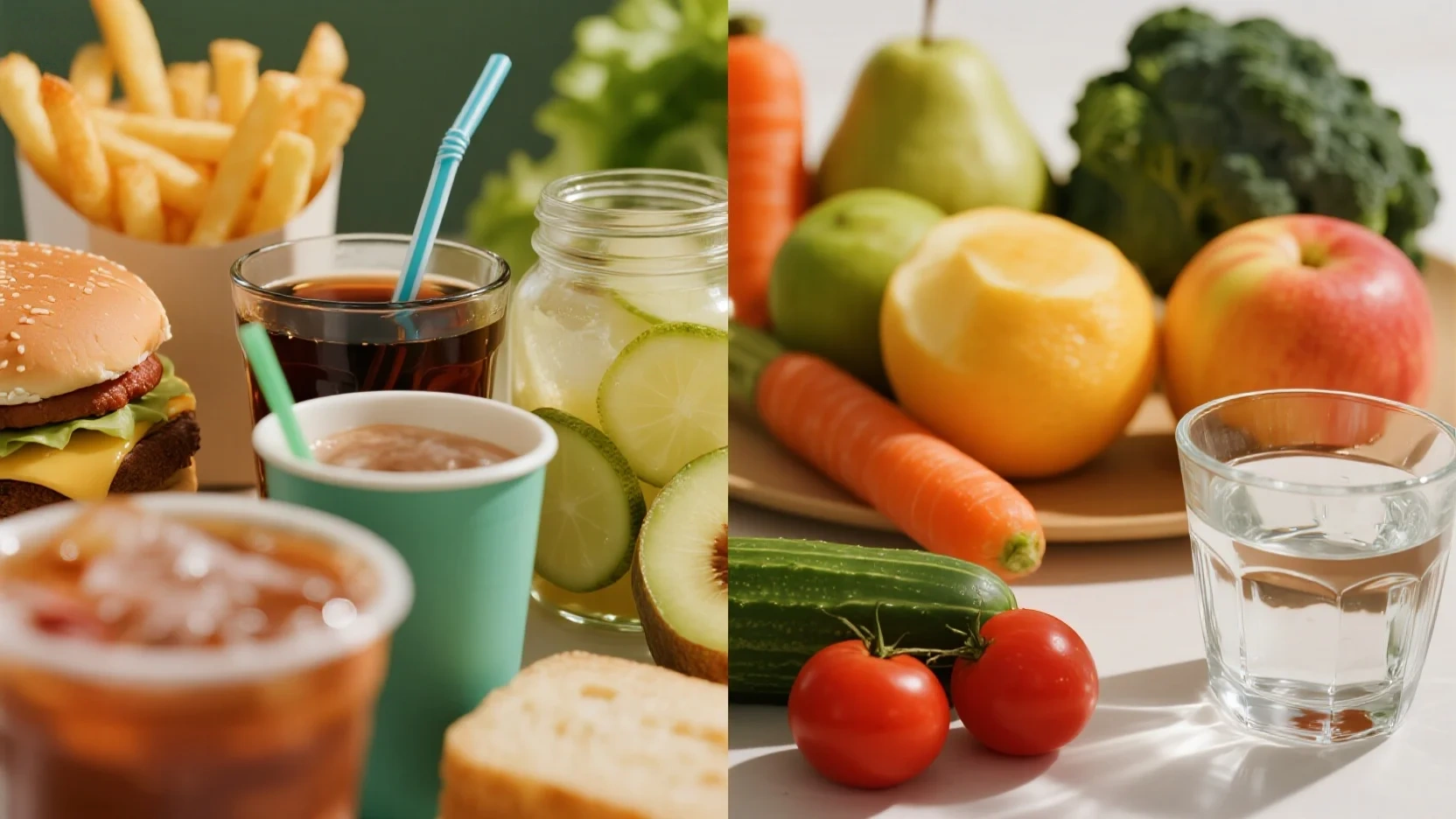Ensuring our children’s health involves making informed dietary choices. While treats are acceptable in moderation, certain foods can pose significant health risks if consumed regularly. Let’s delve into the foods that should be limited or avoided in your child’s diet.
🥤 Sugary Beverages
Why They’re Harmful:
- Empty Calories: Sugary drinks like sodas, sweetened teas, and energy drinks provide high sugar content without essential nutrients.
- Health Risks: Regular consumption is linked to obesity, type 2 diabetes, and dental cavities.
Healthier Alternatives:
- Water
- Unsweetened herbal teas
- Infused water with fruits like lemon or berries
🍟 Fast Food & Fried Snacks
Why They’re Harmful:
- High in Unhealthy Fats: Foods like burgers, fries, and nuggets are often deep-fried, leading to trans fats intake.
- Excessive Sodium: These foods are typically high in salt, contributing to high blood pressure and kidney strain.
Healthier Alternatives:
- Homemade grilled chicken sandwiches
- Baked sweet potato fries
- Whole-grain wraps with lean proteins
🍬 Candies & Sweets
Why They’re Harmful:
- High Sugar Content: Candies and chocolates are rich in sugars, leading to energy spikes followed by crashes.
- Dental Issues: Frequent consumption can result in cavities and other dental problems.
Healthier Alternatives:
- Fresh fruits like apples or berries
- Homemade fruit popsicles
- Yogurt with natural sweeteners like honey
🥣 Sugary Cereals
Why They’re Harmful:
- High Sugar Levels: Many cereals marketed to children contain high amounts of added sugars.
- Low Nutritional Value: They often lack essential nutrients and fiber.
Healthier Alternatives:
- Oatmeal with fresh fruits and nuts
- Whole-grain cereals with low or no added sugars
🍿 Microwave Popcorn
Why They’re Harmful:
- Added Chemicals: Some microwave popcorn brands contain artificial flavorings and preservatives.
- Unhealthy Fats: Certain brands use hydrogenated oils, leading to trans fats intake.
Healthier Alternatives:
- Air-popped popcorn with minimal salt
- Homemade popcorn with olive oil and herbs
🧃 Fruit Snacks
Why They’re Harmful:
- High Sugar Content: Despite being labeled as “fruit,” many fruit snacks contain added sugars and artificial colors.
- Low Nutritional Value: They often lack the fiber and vitamins found in whole fruits.
Healthier Alternatives:
- Fresh fruit slices
- Dried fruits without added sugars
🍕 Instant Noodles
Why They’re Harmful:
- High Sodium Levels: Instant noodles often contain excessive amounts of salt.
- Low Protein Content: They typically lack essential proteins and nutrients.
Healthier Alternatives:
- Whole-grain pasta with homemade tomato sauce
- Noodles made from vegetables like zucchini or sweet potatoes
🥡 Packaged Snacks
Why They’re Harmful:
- High in Preservatives: Many packaged snacks contain artificial additives and preservatives.
- Low Nutritional Value: They often provide little nutritional benefit and are calorie-dense.
Healthier Alternatives:
- Homemade trail mix with nuts and dried fruits
- Vegetable sticks with hummus dip
🧃 Juice Boxes
Why They’re Harmful:
- High Sugar Content: Many juice boxes contain added sugars and lack fiber.
- Dental Issues: Frequent consumption can contribute to tooth decay.
Healthier Alternatives:
- Freshly squeezed fruit juices without added sugars
- Smoothies made with whole fruits and vegetables
🧁 Pastries & Baked Goods
Why They’re Harmful:
- High in Unhealthy Fats: Commercial pastries often contain trans fats.
- High Sugar Levels: They are typically rich in sugars, leading to energy crashes.
Healthier Alternatives:
- Homemade muffins with whole grains and fruits
- Baked goods using natural sweeteners like applesauce
🧠 Final Thoughts
While it’s tempting to indulge in these foods, moderation is key. Encouraging a balanced diet rich in whole foods like fruits, vegetables, whole grains, and lean proteins can set the foundation for a healthy lifestyle. Remember, it’s not about complete restriction but about making informed choices that benefit your child’s long-term health. 🌟








